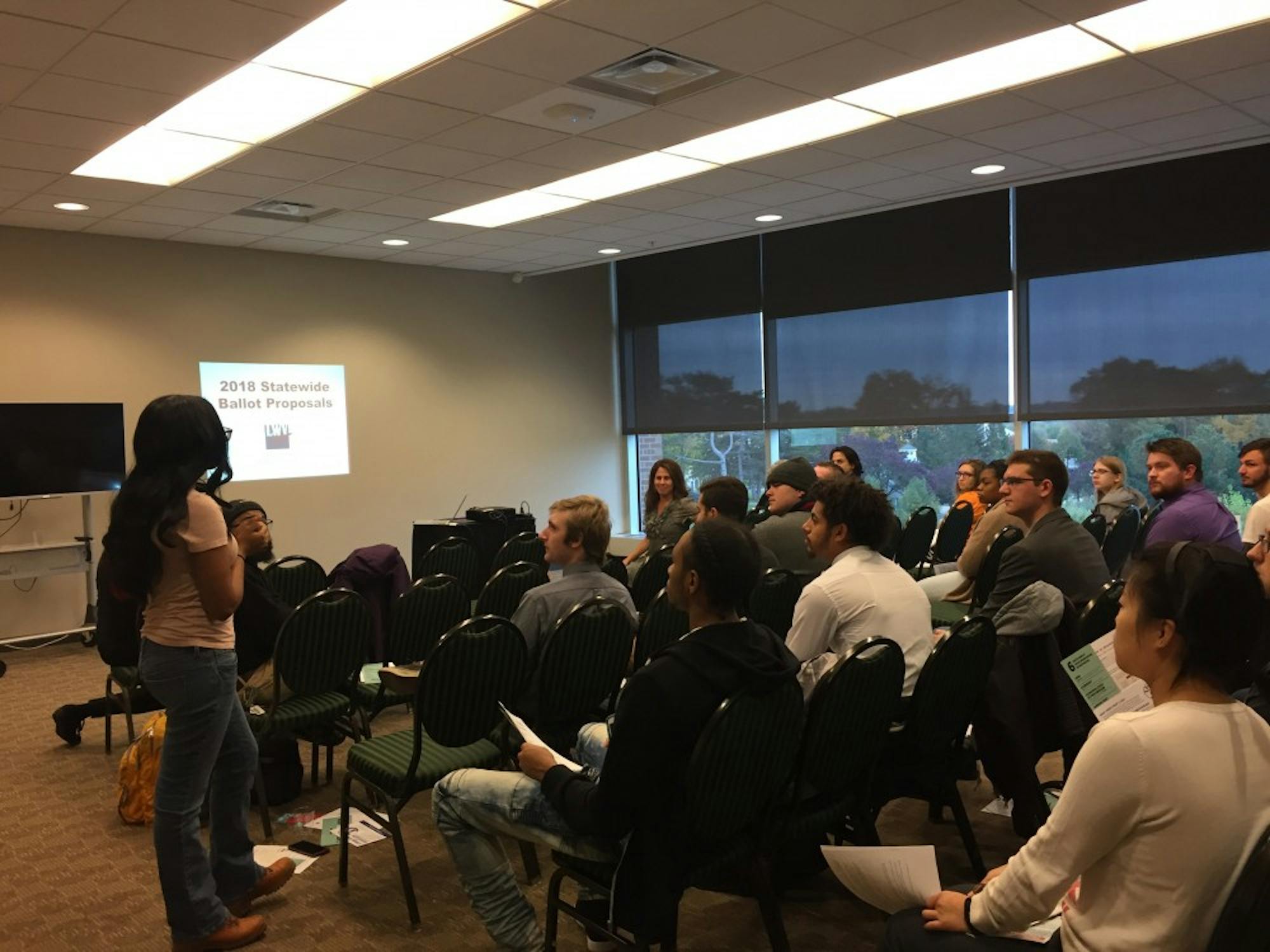The major proposals on the ballot for the upcoming midterm elections were discussed among students at Eastern Michigan University (EMU) with the help of the League of Women’s Voters and Engage EMU.
On Tuesday, Oct. 30, students gathered in room 352 of the Student Center from 4:30 - 6:30 p.m. to gain information on the three proposals on the U.S. midterm elections ballot. A table with various informational pamphlets and flyers were available to pick up, some breaking down certain proposals and others encouraging students to vote.
The event was put together by the Ann Arbor’s League of Women’s Voters (LMV) and sponsored by Engage EMU, the university’s primary coordinator or business and community based events, and EMU-AAUP, the university’s teachers union. Judy Kullberg, the president of EMU-AAUP, introduced the event to the small crowd of 29 attendees.
“The ballot proposals that we will all vote on on November 6 have great significance for the future of our state,” she said. “They, if adopted, will fundamentally change politics in Michigan.”
Margaret Leery, a librarian and retired lawyer, who obtained her master’s in history at EMU, represented the LWV. She introduced every proposal, going over the reasonings for approval and disapproval of each one. She also showed the supporters and opposers of each proposal.
“We (the LWV) are non-partisan, but we’re also political, which is a little difficult to grasp,” she said at the beginning of the presentation. “Non-partisan means we do not support political parties, that we do not support individual candidates...political means that we do pay attention policy issues as they arise.”
The proposals on the ballot discussed during the presentation were as follows:
-
Proposal 1 - The creation of the Michigan Regulation and Taxation of Marijuana Act, which would allow individuals 21 and older to purchase, possess, and use marijuana and marijuana-infused edibles, and grow up to 12 marijuana plants for personal consumption.
If passed, the proposal would give way to the creation of a state licensing system for marijuana businesses and allow municipalities to ban or restrict them. Retail sales of marijuana and edibles would be subject to a 10% excise tax, dedicated to: implementation costs and clinical trials researching the health concerns of marijuana, school funding, roads, and municipalities where marijuana businesses are located. -
Proposal 2 - If passed, this proposal would create a commission of 13 registered voters randomly selected by the Secretary of State to be responsible for redrawing the state voting districts after every census. Those with seats on the commission cannot be partisan officeholders, candidates for office, employees of candidates/officeholders, or certain relatives of those candidates/officeholders. Lobbyists are also prohibited from serving as commissioners. The commission would be made up of four registered Democrats, four registered Republicans, and five registered Independents. Commissioners would be compensated for their work (approximately 25 percent of the state governor's salary.)
The new redistricting criteria would include geographically compact and contiguous districts of equal population. Districts cannot provide disproportionate advantage to political parties or candidates. The proposal’s primary objective is to tackle the use of gerrymandering by the controlling political party. -
Proposal 3 - If passed, this proposal would allow residents to automatically be registered to vote when applying for, renewing, or updating their driver’s license or state-issued personal identification card, unless the person declines. It would also allow residents to simultaneously register to vote with proof of residency and obtain a ballot during the two-week period prior to an election, including the actual election day.
This proposal, if passed, would also allow voters to cast a straight-ticket ballot (voting for all candidate of a particular political party) and obtain an absentee ballot without providing a reason.
Attendees asked various questions during the explanations. Rena Basch, a outreach committee member for Voters Not Politicians, represented the supporting side of Proposal 2. Nick Zettell, co-founder of the MILegalize organization, represented the supporting side for Proposal 1. While opposing representatives were invited to discuss counterarguments, no one did during the presentation. Most of the literature available to attendees were also on the the supporting end of the proposals rather then the opposing.
When asked about the frequent lack of participation from young voters at elections, Zettell said the reasoning didn’t lie in intelligence but experience.
“I think that people who have lived a long time have seen multiple elections come and go and they’ve seen the impact local elections have,” he said. “Whether or not you believe your vote matters in a presidential election is up for debate, but local elections can be decided by one vote.”
Basch said she couldn’t even fathom why someone wouldn’t vote.
“I honestly don’t know (why),” she said. “It’s...young people are busy? And maybe they don’t think it’s important, and I think a big factor is they don’t think their vote matters...so yeah I honestly don’t know I’m just guessing here.”
Michigan’s midterm elections will take place on Tuesday, Nov. 6, with voting taking place from 7 a.m. - 8 p.m. EMU’s Honors College will be hosting a polling location for students and other citizens of Ypsilanti. A full list of Ypsilanti polling locations is available on the city’s website.








